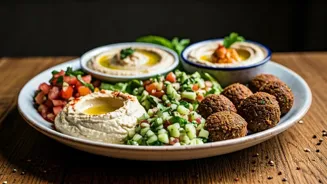Roots and Influences
Israeli cuisine, a vibrant food tradition, is a beautiful blend of multiple cultures. Its foundation lies in the diverse influences brought by immigrants
from various regions, including the Middle East, North Africa, and Europe. Early Israeli cooking relied on local ingredients, such as seasonal vegetables and fruits, along with traditional spices and methods from the Middle East. This combination established the basics, with flavors like hummus, falafel, and shawarma becoming staples. Over time, as immigrants continued to arrive, they brought their own tastes and methods, resulting in a diverse culinary landscape. European influences brought baked goods and dairy-based treats, enriching the already varied flavors. Furthermore, the Mediterranean area's influence offered fresh ingredients, such as olive oil and herbs, which improved flavors. These interactions shaped the unique fusion of Israeli cuisine that is still evolving today, demonstrating the nation's multicultural legacy through its food.
Key Dishes Explored
Several key dishes define Israeli cuisine, embodying its diverse influences. Hummus, a smooth chickpea paste, remains a staple, eaten as a dip or a side. Falafel, deep-fried balls of ground chickpeas, are also highly favored as a street food and are frequently served with pita bread. Shawarma, grilled meat, adds another dimension, with the meat flavored with different spices and flavors. The cuisine also features a variety of fresh salads, such as Israeli salad made with diced tomatoes, cucumbers, and onions, all seasoned with lemon juice and olive oil. Additionally, there are different types of soups and stews that highlight seasonal ingredients, which provides warmth and flavors. The combination of flavors found in these dishes reflects the history and cultural diversity of Israel, providing both familiar and novel culinary experiences.
Historical Evolution of Flavors
The historical development of Israeli cuisine shows a continuous adaptation and improvement. Initially, early Israeli cuisine prioritized making food using local ingredients, such as grains, vegetables, and fruits. This approach was driven by the need for practicality, as people adapted to their environment. As immigrants from different places brought various spices and flavors, this simplicity changed to accommodate a more extensive array of ingredients and cooking methods. With the establishment of the State of Israel in 1948, the cuisine saw more changes, as a feeling of national identity took place. Chefs started mixing traditional recipes with modern cooking methods, producing original dishes. The integration of ingredients from other cultures, like the Mediterranean, had a noticeable impact on the flavors. Today, Israeli cuisine continues to evolve as chefs mix tradition with innovation, resulting in a dynamic and changing food landscape that reflects both heritage and innovation.
Immigration's Culinary Impact
Immigration has played a huge role in shaping Israeli cuisine. Each wave of immigrants introduced unique flavors and cooking methods, which increased its variety. The impact is evident in the many traditional dishes that are eaten today. Immigrants from Yemen brought their own spices and cooking styles, which improved the flavor profiles. Those from North Africa introduced tagines and couscous, adding new dimensions to cooking. Moreover, the influence of the Sephardic and Ashkenazi traditions brought different culinary aspects, such as new bread recipes. These many influences came together to create a cuisine that reflects the varied cultural backgrounds of its people. This combination highlights the dynamic nature of Israeli culture and how the mixing of culinary traditions can produce a food tradition that's both diverse and innovative.
The Future of Israeli Cuisine
The future of Israeli cuisine seems full of possibilities, with a global focus on both tradition and innovation. The modern culinary scene reflects a strong interest in using high-quality, local ingredients, showcasing Israeli agriculture. Israeli chefs are beginning to experiment with contemporary cooking methods. Sustainability and ethical sourcing are becoming increasingly significant, and many restaurants are working to limit their environmental impact. Israeli food's popularity is growing globally, with restaurants and chefs appearing around the world. Fusion cuisine, which combines traditional dishes with modern flavors, is also becoming a popular trend. As Israel gains more exposure in the international food industry, its cuisine will keep adapting, developing, and influencing the global culinary stage, demonstrating its creative and varied character.














